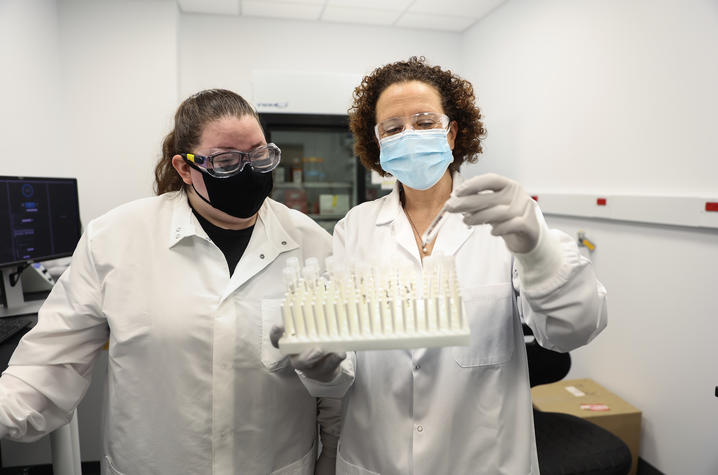UK Study: Asymptomatic COVID-19 Could Still Cause Pregnancy Risks

LEXINGTON, Ky. (May 31, 2022) — According to a new University of Kentucky College of Medicine study, asymptomatic COVID-19 infection during pregnancy could still have potential long-term consequences for a developing baby.
The study led by Ilhem Messoudi, Ph.D., chair of the Department of Microbiology, Immunology and Molecular Genetics, was published in Cell Reports May 25.
The research shows that COVID-19 infection in pregnant mothers who were asymptomatic or had mild symptoms still triggered immune responses causing inflammation in the placenta.
“Prior to this study, this response was only thought to occur in severe COVID-19 cases,” said Messaoudi. “We now know that even a mild infection that doesn’t even register with a patient is still being registered by the maternal immune system. The placenta had very clear signs of having sensed that there was an infection.”
Because the placenta protects a developing fetus from many pathogens including SARS-CoV-2, transmission of the virus between mother and baby is extremely rare, but the greatest risk for a fetus is how the mother’s immune system responds to the virus.
Immune responses triggering inflammation of the placenta can be linked to adverse pregnancy outcomes including preterm labor and preeclampsia, as well as neonatal complications due to reduced immune function of the baby, Messaoudi says.
Using single-cell RNA-sequencing and multicolor flow cytometry, Messaoudi’s team analyzed immune cells in placenta tissue and blood from pregnant mothers who tested positive for SARS-CoV-2 prior to delivery. Samples from women with asymptomatic/mild COVID-19 were then compared to those without infection.
Results show that while patients testing positive had activated T-cells, they had reduced levels of specialized macrophage cells that regulate the tissue. The immune cells in the placenta were “rewired” in a way that made the tissue more prone to inflammation.
The findings add to scientists’ growing understanding of the maternal immune system and SARS-CoV-2 and will help lead to future studies on potential long-term impacts for mothers and babies.
“This tells us how capable the maternal immune system is … while at the same time shows how detrimental COVID-19 can be even when the infection is not severe,” Messaoudi said. “These are all reasons why it’s so important that pregnant mothers get vaccinated.”
Research reported in this publication was supported by the National Center for Advancing Translational Sciences of the National Institutes of Health under Award Numbers UL1TR001414, R01AI142841 and R01AI145910. The content is solely the responsibility of the authors and does not necessarily represent the official views of the National Institutes of Health.
As the state’s flagship, land-grant institution, the University of Kentucky exists to advance the Commonwealth. We do that by preparing the next generation of leaders — placing students at the heart of everything we do — and transforming the lives of Kentuckians through education, research and creative work, service and health care. We pride ourselves on being a catalyst for breakthroughs and a force for healing, a place where ingenuity unfolds. It's all made possible by our people — visionaries, disruptors and pioneers — who make up 200 academic programs, a $476.5 million research and development enterprise and a world-class medical center, all on one campus.




